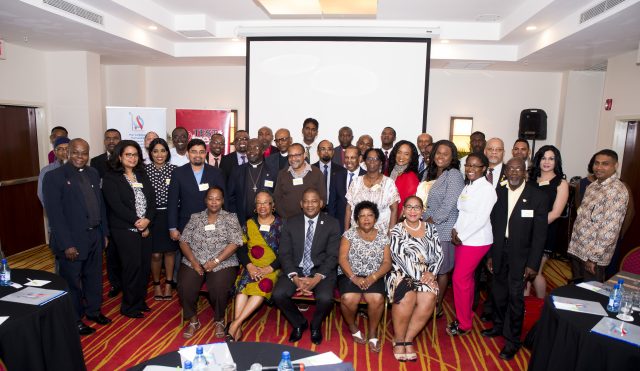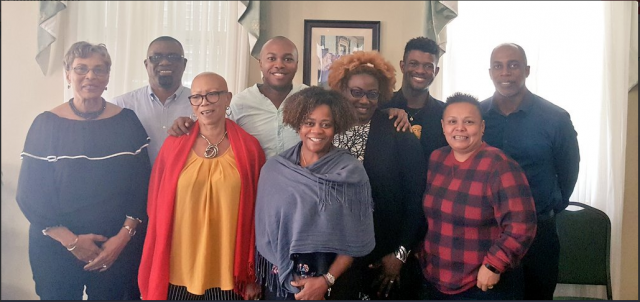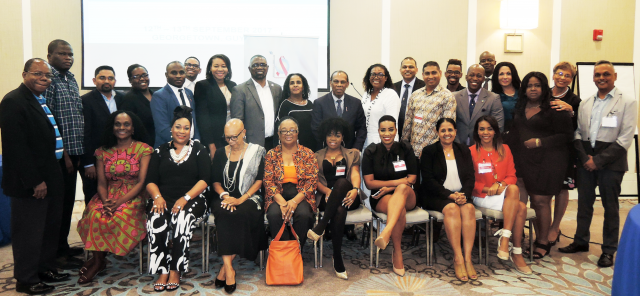Opening Ceremony
Canon Garth Minott, Co-Chair, described the dialogue between Caribbean Religious Leaders and Representatives of key populations (sex workers, the LGBT community, Transgender community, etc.) as a historic occasion. He highlighted that it was one of the major outcomes of the PANCAP Conference involving 50 Religious Leaders from across the Caribbean Region held in Trinidad and Tobago February 1-2, 2017. He stated that the aim of the dialogue was to establish how the collaboration between Religious Leaders and Key Populations could contribute to the Region’s quest to end the AIDS epidemic by 2030. He identified the focus as:
• Addressing the gaps in treatment and prevention of HIV with special reference to the 90-90-90 test and treat targets and the strategies for combination prevention
• Promoting the reduction of stigma and discrimination especially in relation to key populations
• Promoting a viable legislative environment while fostering compliance with the principles of human rights, human sexuality, and human dignity.
• Forging partnerships and reconciling overlapping and divergent aspects of secular and religious governance that deal with the sacredness and wholeness of each person and social action to promote their dignity
Mr. Dereck Springer brought greetings from Prime Minister, Timothy Harris, CARICOM Lead Head for Human Resources, Health and HIV and Ambassador Irwin La Rocque, CARICOM Secretary General. He stated that the dialogue is a milestone for PANCAP and is consistent with the goals of the PANCAP Justice for All Programme as well as the 2016 UN Political Declaration to which all CARICOM States are committed. In his view, it reflects the attempt to better understand the convergence of the social and theological perspectives that would contribute to agreements on what it takes to reduce stigma and discrimination.
Dr. Yitades Gebre, PAHO/WHO Representative to Suriname, said the theme of the dialogue is a reminder that every human life is of inestimable value. He expected the outcomes of the dialogue to create an environment that is inclusive and to provide options for bridging diversity, breaking down the barriers of stigma and discrimination and increasing involvement of treatment and prevention partners. Taking action on these issues is consistent with the PAHO/WHO goal for achieving Universal Access to Health for all.
Giving the keynote address, His Excellency Patrick Pengel, Minister of Health, Suriname and Chair of the PANCAP Executive Board stated that Suriname is pleased to host the dialogue. It is a country known for its liberal embrace of diversity. He reiterated the fact that Suriname joined other CARICOM Countries in supporting the 2016 UN High-Level Political Declaration aimed at ending HIV/AIDS by 2030 and that It is particularly committed to the UN 90-90-90 targets. He stressed the importance of partnerships and access to information to reduce stigma, hence the need to strengthen the health information systems, improve the continuum of healthcare and implementing policies reflecting equity in health and life circumstances. This requires compassion for all, commitment to principles that empower rather than marginalize and action that is inclusive and does not leave anyone behind. He advocated for human rights health desks as an important mechanism linking inter-religious networks and key populations. He stated that the dialogue hosted by PANCAP and bringing together Religious Leaders and representatives of key populations is applauded by the Government of Suriname
Colin Robinson gave the vote of thanks with the charge that participants “unpack the tools” needed to do the work: their faith, hopes, and biases.
Plenary Sessions on the Perspectives of Religious Leaders and Key Populations
The first two Plenary Sessions dealt with the complementary issues of the experiences of Religious Leaders and Key Populations. They more specifically dealt with gay, lesbian, bisexual, persons of trans experience and intersex persons, sex work experiences, young people and confronting the challenges of stigma and discrimination.
Among the major issues that emerged were: (a) the general experiences that require special attention by both Religious Leaders and Representatives of Key Populations and (b) the policies that promote inclusion of Key populations in the decision making process.
General Issues emerging from the dialogue between Religious Leaders and Key Populations
• The lived experience of people is at the heart of human sexuality and is a part of who people are.
• Where there is a conflict in matters of religion, philosophy, psychology, law, and human rights principles, it should be ensured that the latter is given consideration.
• In promoting health and well-being there is need to engage the religious community in better understanding of the critical issues of stigma and discrimination and the special challenges of key populations which include youth.
• Account must be taken that different populations/vulnerable groups overlap—e.g., LGBTI people may be people living in poverty; people with disabilities may be young people; people living with HIV may be elderly people.
• Trans persons presented a special case in relation to gender identity, as distinguished from sexual orientation.
• The importance of the Trans person’s relationship to God is not to be underestimated or disregarded.
• Tackling the major social determinants of health includes poverty which compounds the challenges faced by LGBTI and other Key populations with special reference to access, adherence, stigma, and discrimination.
• Need for the Religious Community to create spaces of hospitality that bring disparate groups together and create the basis for healing, compassion, love, and inclusion.
Four (4) Working Groups addressed specific issues relating to:
• Addressing gaps in treatment and prevention of HIV.
• Addressing determinants of Stigma and Discrimination and partnerships between religious groups and Key Populations in the solution
• Forging Partnerships between Religious Leaders, Parliamentarians and LGBTI towards achieving legislative reform, and
• Ways in which Religious Leaders and Members of Key Populations can appreciate each other’s positions and overcoming differences to achieve results of access to Public Health by key populations.
Issues arising from the discussion and for further consideration:
• Promote and implement policies for inclusion
• Recognize the voice and importance of PLHIV spearheaded by in-country CRN+ networks
• Identify those areas of common agreement and pursue policies with empathy
• Sex Workers “performing a service” and not “selling their bodies” as their human rights to earn a living.
• Reconsider the definition of Sex Work and engage in ongoing dialogue with Governments and sex workers to foster an enabling environment towards ending AIDS by 2030.
• Discuss the concept of Transgender within sacred scripture and theological constructs
• Take cognizance of information based on scientific evidence on human sexuality and sexual and gender diversity
• Incorporate the theological guidelines that ‘all human beings are made in the image of God’ and that ‘God Almighty dwells within all of us’
• Religious teachings may undergo changes based on interpretation and practice.
Religious Leaders Caucus focused on the need for ongoing dialogue and networking within and among religious communities and with members of key populations. Key Populations Caucus affirmed that strengthening Caribbean democracy and justice for all entails a commitment to the principle of including marginalized groups in a range of policy-making and governance, including representation in legislatures, political parties and at planning tables. It was affirmed that key populations and their interests deserve as much a place in governance as do religious representatives.
Recommendations for Constructive Dialogue between Religious Leaders and Key Populations
• Creating spaces of hospitality: “welcome of the strangers/the others in their otherness based on respect— e.g. community evangelism in the Dominican Republic”
• Establishing the basis for places of worship to give parents tools on Sexuality and incorporate holistic sexuality education into their programmes, including those for youth.
• Making every effort to reach marginalized populations, including advocating for and/or reasonable legislative changes, and seeking to cooperate in this venture.
• Establishing a national mechanism to address social and psychological approaches for dealing with the challenges affecting key populations.
Prayer and Worship
Members of the various religious communities were given opportunities to guide the assembly in moments of meditation, at the beginning and at the end of each day. Reflections were held on the basis of the respective religious traditions present at the consultation. This was an opportunity to engage the faith of the participants with the lived realities discussed within the consultation. This meditation set the tone of the conversations in the plenary, small groups and individual encounters. Through this interreligious approach, participants were able to learn more about one another’s faiths and could also begin to create a better understanding and respect for other faith and perspectives.
The Way Forward
Members of the Regional Consultative Steering Committee for the Implementation of Recommendations to End AIDS by 2030 will meet before the end of February to deliberate on the recommendations from this consultation. Specific focus will be on strengthening the religious networks in each territory and encouraging religious leaders to include representatives from key populations on the steering/management committees. It is anticipated that at least one consultation will be held in each territory in the next twelve to eighteen months. Recommendations from these consultations will be fed into another regional consultation of religious leaders and key populations in two to three years.
Appreciation
Religious Leaders and members of Key Populations worshipped God in joint services on the morning and afternoon of each day. This was to give thanks to God for mercies in making this dialogue possible and in providing a space for both groups to engage in this historic dialogue. We are therefore grateful to God for inspiration and guidance and to our partners locally in Suriname, regionally in CARICOM and PANCAP and globally, especially Global Fund for tangible assistance. To God be the glory.



